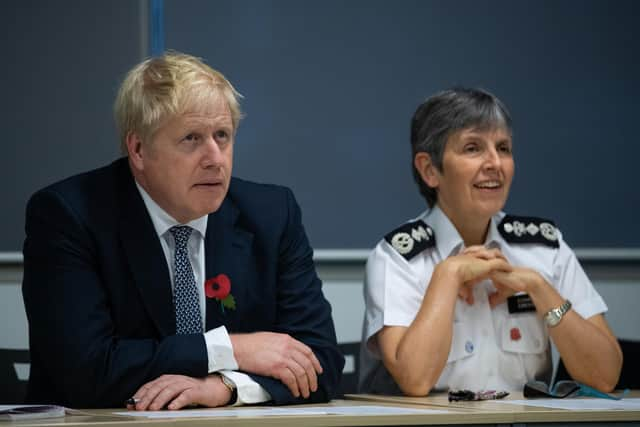Metropolitan Police: its reputation is now as broken as young Wilfred's swing - Dani Garavelli
The latest scandal - the leaving parties held the day before Prince Philip’s funeral - is no exception. The Queen may be “them” not “us”, but she knows how to lead by example. Grief is no respecter of social boundaries. So when she sat masked and alone at her husband’s funeral, she was making a statement: in the midst of a pandemic, the rules apply to us all.
Hours earlier, Downing Street staff were mocking her sacrifice and ours. Carousing in the garden of No. 10, they too were making a statement: that they - and they alone - were above the law.


Advertisement
Hide AdAdvertisement
Hide AdSustaining them in this delusion was the Metropolitan Police: a force whose reputation is now as broken as young Wilfred's swing. It is inconceivable officers on duty at No. 10 were not aware of what was going on. But they treated these breaches differently to supposed breaches on Clapham Common, turning a blind eye to one and raising a truncheon to the other.
As I said, juxtaposition is important. It holds behaviour up to the light; it exposes double standards. The handling of the vigil held for Sarah Everard seemed heavy-handed even at the time: protesters pinned down like drug-dealers for the "offence" of honouring a woman murdered by a serving officer. But when you realise the Met had spent the previous 10 months ignoring law-breaking at No. 10 (and would do so again a few weeks later) it makes you wonder if this is less about unconscious prejudice and more about institutional complicity.
That suspicion is reinforced by the revelation that over the course of the pandemic, 371 people were fined £10,000 for holding gatherings of more than 30; but that - even now - the Met is refusing to take action against No. 10 unless civil servant Sue Gray’s investigation uncovers “evidence of criminality”. This despite the resignation of Allegra Stratton, the still images of drinks in the garden and Downing Street having apologised to Buckingham Palace.
When the full story of the UK government’s handling of the pandemic is finally told, its unhealthy relationship with the Met will surely be at the heart of it. The extent to which the backgrounds and interests of those at the top of these institutions interlock undermines their capacity to act as checks and balances on one another.
The establishment has always been a small, closed place, dripping with privilege. But under the Tories - and in the hothouse of the pandemic - those ties have become ever more blatant and pernicious. That Johnson, Met Commissioner Cressida Dick and sex trafficker Ghislaine Maxwell all attended Balliol College, Oxford, in the early 80s, and that the deputy assistant commissioner of the Met, Bas Javid, is Health Secretary Sajid Javid's brother says all we need to know about the tightness of the circle.
Dick’s career has been controversial. She headed the operation that led to the shooting of Jean Charles de Menezes (but was later cleared of personal blame). And just last year, she was accused of hampering the official inquiry into the murder of private investigator Daniel Morgan. At the same time, the Met has been fermenting a barrel-load of rotten apples. Everard’s murderer Wayne Couzens and the officers who took and shared photographs of murder victims Nicole Smallman and Bibaa Henry are now in jail. Another officer faces charges of sexual assault.
You’d think the reaction to this might be to curb police powers. Instead, the Tory government appears determined to strengthen them. Dick has been criticised for intensifying stop and search, with its disproportionate impact on black communities. Yet the Police Bill would extend those powers, making it easier for police to stop and search people who have been convicted of carrying a knife. In 2019, the High Court declared the force’s attempt to ban Extinction Rebellion protests illegal. Yet the new Bill would allow officers to arrest anyone deemed to be causing a public nuisance.
The UK government and the Met also share a sense of entitlement. Johnson and Dick have perfected the art of the non-apology apology. Johnson was sorry about a separate party he personally attended - on 20 May, 2020 - "even if it could be said technically to fall within the guidance”. Dick is a serial expresser of regret; but neither of them regrets anything enough to resign. Taking responsibility does not appear to be in their skill set.
Advertisement
Hide AdAdvertisement
Hide AdThen there is the way journalists move seamlessly from newspapers to political posts and back again. One of the No. 10 leaving dos the night before Prince Philip’s funeral was for James Slack, Johnson's spokesperson, who was joining the Sun. In his previous incarnation as the Daily Mail’s political editor, Slack was responsible for the infamous Enemies of the People splash. Now, he is best known as the deputy editor who sat on the story of his own lockdown party.
When journalists are working with politicians to further a shared agenda, rather than holding them to account, what hope is there for democracy?
Thankfully, other journalists are still doing their job. Let’s hope their exposés sweep Johnson out of office. But the resignations cannot end with him. Only a dismantling of the power structures that have bolstered his corrupt government will clear the way to rebuild the public trust the Prime Minister has squandered.
A message from the Editor:
Thank you for reading this article. We're more reliant on your support than ever as the shift in consumer habits brought about by coronavirus impacts our advertisers.
If you haven't already, please consider supporting our trusted, fact-checked journalism by taking out a digital subscription.
Comments
Want to join the conversation? Please or to comment on this article.
